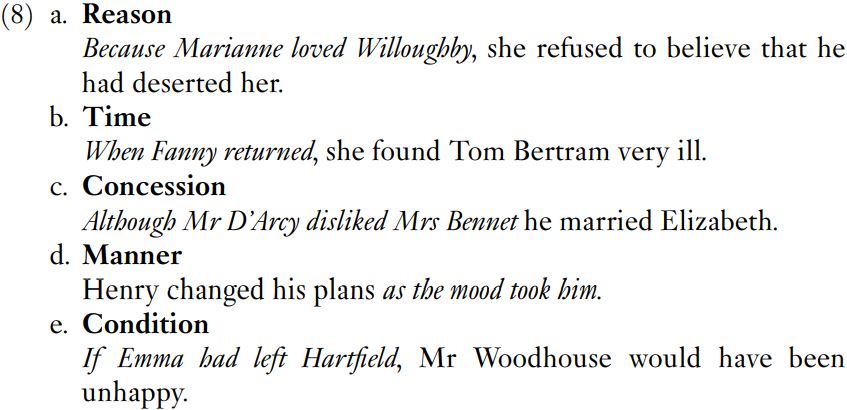


 Grammar
Grammar
 Tenses
Tenses
 Present
Present
 Past
Past
 Future
Future
 Parts Of Speech
Parts Of Speech
 Nouns
Nouns
 Verbs
Verbs
 Adverbs
Adverbs
 Adjectives
Adjectives
 Pronouns
Pronouns
 Pre Position
Pre Position
 Preposition by function
Preposition by function 
 Preposition by construction
Preposition by construction
 Conjunctions
Conjunctions
 Interjections
Interjections
 Grammar Rules
Grammar Rules
 Linguistics
Linguistics
 Semantics
Semantics
 Pragmatics
Pragmatics
 Reading Comprehension
Reading Comprehension|
Read More
Date: 2023-06-23
Date: 2023-12-02
Date: 2-8-2022
|
The name ‘adverbial’ suggests that adverbial clauses modify verbs; but they modify whole clauses, as shown by the examples in (8). Their other key property is that they are adjuncts, since they are typically optional constituents in sentences. They are traditionally classified according to their meaning, for example adverbial clauses of reason, time, concession, manner or condition, as illustrated below.
 The adverbial clause of reason in (8a), Because Marianne loved Willoughby, gives the reason (or the writer uses it to give the reason) why Marianne refused to believe that Willoughby had gone. It modifies the main clause she refused to believe that he had deserted her.
The adverbial clause of reason in (8a), Because Marianne loved Willoughby, gives the reason (or the writer uses it to give the reason) why Marianne refused to believe that Willoughby had gone. It modifies the main clause she refused to believe that he had deserted her.
The adverbial clause of time in (8b), When Fanny returned, gives the time at which another event happened, namely her finding Tom Bertram ill. It modifies the main clause she found Tom Bertram very ill.
The adverbial clause of concession in (8c), Although Mr D’Arcy disliked Mrs Bennet, conveys a concession. The writer says, as it were, ‘OK. I concede that he didn’t like Mrs Bennet. Nonetheless he married Elizabeth.’ The adverbial clause modifies the main clause he married Elizabeth.
The adverbial clause of manner in (8d), as the mood took him, describes the manner in which Henry changed his plans and modifies the main clause Henry changed his plans.
In (8e), the adverbial clause of condition If Emma had left Hartfield conveys the circumstances or conditions under which a particular situation would have arisen. The situation is Mr Woodhouse being unhappy, and the writer declares that this situation did not actually come about but would have done; Emma’s leaving Hartfield would have brought it about. The crucial fact is the relationship between the two situations; Mr Woodhouse’s being unhappy is conditional upon Emma’s leaving Hartfield. The adverbial clause of condition modifies the main clause Mr Woodhouse would have been unhappy.
|
|
|
|
تفوقت في الاختبار على الجميع.. فاكهة "خارقة" في عالم التغذية
|
|
|
|
|
|
|
أمين عام أوبك: النفط الخام والغاز الطبيعي "هبة من الله"
|
|
|
|
|
|
|
قسم شؤون المعارف ينظم دورة عن آليات عمل الفهارس الفنية للموسوعات والكتب لملاكاته
|
|
|